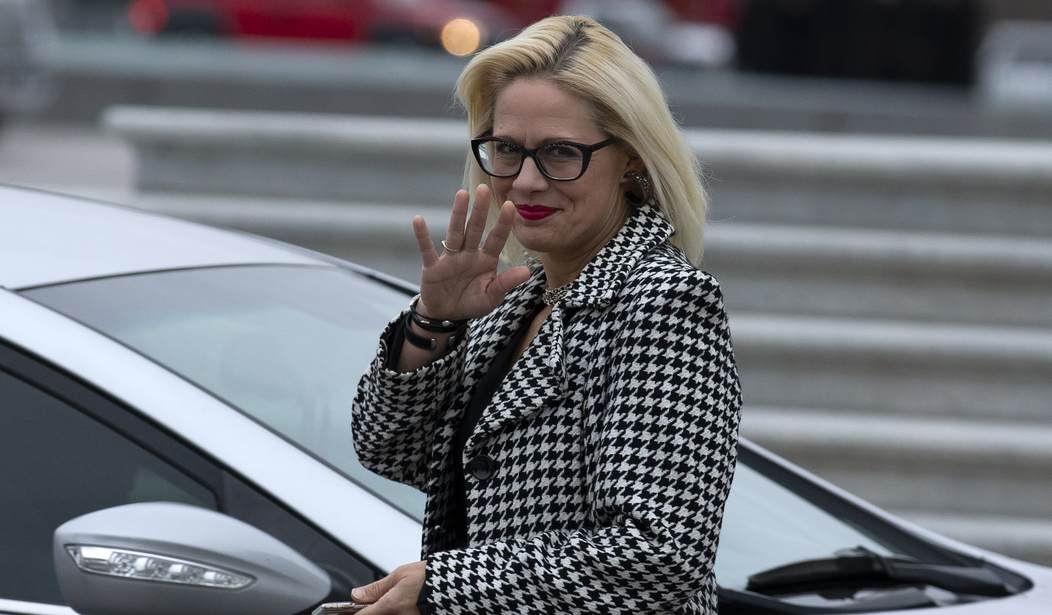Resolved: Kyrsten Sinema meant what she said — and she’s about to put her money where her mouth is. Well, perhaps more accurately, Sinema will put contributors’ money where her mouth is. And thanks to her action yesterday, Sinema can start doing that pretty much immediately:
Sen. Kyrsten Sinema has taken the formal step of filing paperwork as an independent candidate for 2024, even though she hasn’t publicly said if she will seek reelection. …
Filing a statement of candidacy doesn’t bind Ms. Sinema to a run, but it does allow her to raise money.
It does do that, and very early in the cycle, too. Sinema will need that money to run as an independent, and she will need it quickly. Qualifying for the ballot in Arizona as a candidate for US Senate as an independent is far tougher than qualifying as a major-party candidate. Major-party candidates need to file enough petitions to amount to 0.25% of the “qualified signers” in the state to get on the ballot. In a state with 4.14 million registered voters, that requires 10,360 signatures — which the party orgs usually produce after the primaries rather than the campaigns.
Sinema, however, will have to get workers and volunteers to collect enough signatures to qualify. Independent candidates are required to get enough signatures to represent 3% of all unaffiliated voters in Arizona. The state has 1.404 million “other” voters, and three percent of that number comes to 42,132 signatures — which have to be checked and verified as registered independents. To accomplish this, Sinema will need to start as soon as possible in setting up her campaign and petition-drive structure, and that means fundraising now rather than later.
As an aside, these requirements are not unusual. States have a legitimate interest in limiting ballot access to only candidates who take this seriously enough to invest in their campaigns. Major parties get preferential treatment because they employ a vetting process for nominations — usually primaries, sometimes caucuses. (Whether those actually produce serious candidates is a matter of taste and timing, of course.)
These kinds of restrictions are usually in place for presidential candidates too, which is something to remember when certain candidates threaten to run as independents. It takes a lot of time, money, and especially organizational talent across 50 states to make that happen, and even then it has been historically unsuccessful. H. Ross Perot had all of those qualities in 1992, knit together a coalition of small parties to combine with his own campaign and call it the Reform Party, and ran a truly national campaign that got nearly 20% of the popular vote — and never won a single state.
The question now will be how much of the money that normally goes to the Democrat in Arizona will still come to Sinema. Undoubtedly, Sinema has built ties to fundraising sources over the years in the House and Senate that will at least give her a hearing. That will also depend on whom the Democrats end up nominating to run in the same election, and if they bother to nominate a contender rather than just a placeholder. Ruben Gallego would definitely get progressive funding, but that might send moderate Democrat donors to Sinema:
At least two Democratic House members, Reps. Ruben Gallego and Greg Stanton, are considering challenging Ms. Sinema. In a three-way race there is the potential that Ms. Sinema and the Democratic candidate would split votes, boosting the Republican candidate.
That would also depend on the Republican candidate. The GOP tried to recruit outgoing governor Doug Ducey to run this year, and he likely would have beaten Mark Kelly easily. Blake Masters ended up with the nomination over outgoing AG Mark Brnovich and ended up losing to Kelly instead. Masters isn’t yet rejecting another run in 2024, but that holds risks for the GOP as it might end up boosting Sinema:
Several Republicans have been floated as possible challengers, including departing Gov. Doug Ducey and venture capitalist Blake Masters, who lost to Democratic Sen. Mark Kelly in November for the state’s other Senate seat. Mr. Ducey said Tuesday he wasn’t interested, according to an Arizona Republic reporter. Mr. Masters hasn’t made any announcements.
Masters finished five points behind Kelly with 1.196 million votes. That was about 75,000 fewer votes than Kari Lake got in a narrower loss to Katie Hobbs for governor, and nearly 200,000 fewer than Kim Yee got for state treasurer in her 56/44 win over Martín Quezada. A lot of people inclined to vote for Yee rejected Masters, likely thanks to his obsession over the 2020 election in the primary fight. A three-way race with Masters might help him win with a plurality, but it may send even more GOP-leaning voters to the independent choice in the race, especially if it pits the more extreme Gallego against Masters. Republicans need a better choice as nominee, even for a three-way fight.
It certainly will send the money in that direction. That’s what we should watch as 2023 opens up and Sinema attempts to get her campaign in gear. Follow the money to see exactly who’s funding her independent campaign — and why.








Join the conversation as a VIP Member